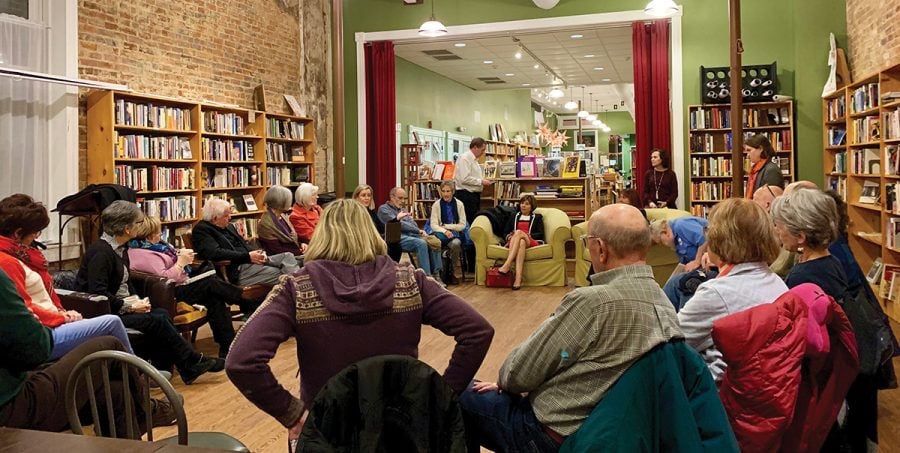Scuppernong Books hosts “Mountains Beyond Mountains: The Quest of Dr. Paul Farmer, a Man who would Cure the World” discussion
On Jan. 17 Scuppernong Books hosted a discussion of “Mountains Beyond Mountains: The Quest of Dr. Paul Farmer, a Man who would Cure the World” by Tracy Kidder.
On Thursday, Jan. 17 at 7 p.m., Scuppernong Books in Downtown Greensboro was packed full with subscribers of the Guilford College Bryan Series. This might look strange to the passerby, but taking a closer look, each subscriber had something common in hand. They each have a copy of Pulitzer Prize winning novel “Mountains Beyond Mountains: The Quest of Dr. Paul Farmer, A Man Who Would Cure the World,” by Tracy Kidder.
Guilford and Greensboro community members gathered in discussion of the novel, which details the life events of Physician and Anthropologist Farmer. The conversation was facilitated by Associate Professor of Biology and Co-Director of Public Health Michele Malotky, and was held to promote Farmer’s upcoming talk for Guilford’s Bryan Series, which is scheduled to take place on Tuesday, Feb. 19, at the Greensboro Coliseum.
“Mountains Beyond Mountains” tells the story of Farmer’s journey in pushing to improve healthcare globally, an ongoing initiative he is still actively working for.
Born into an impoverished family, Farmer witnessed the negative implications of inaccessibility to healthcare first hand. These childhood experiences played a large role in inspiring Farmer to advocate for a healthcare system accessible to all community members. He is now the co-founder of Partners in Health and chair of the Department of Global Health and Social Medicine at Harvard Medical School. He additionally serves as U.N. Special Adviser to the Secretary-General on Community-based Medicine and Lessons from Haiti and chief of the Division of Global Health Equity at Brigham and Women’s Hospital in Boston.
Malotky opened the discussion event with introductions of those in attendance.
“If we could just go around the room real quick and just have everybody introduce their first names … and give me a noun or a word that you can think of that impersonates Dr. Paul Farmer,” Malotky said.
In response, words like humanitarian, selfless, compassionate, relentless, inspiring, visionary and passionate began floating around the room in description of Farmer and his work. This is a clear indication that the impact of Farmer’s work extends even to those who have not personally witnessed it.
Malotky described Farmer’s tactics as a “sort of Robin Hood approach to tackling poverty.”
She continued by imagining something Farmer might say.
“‘It’s here, and somebody needs it,’” Malotky said.
Rather than thinking about himself and how much profit he could make through providing treatments for individuals, Farmer first and foremost strives to help others.
Malotky elaborated on this approach.
“He gives, essentially, a stipend to patients to make sure that they have food to eat,” Malotky said. “(At Partners in Health), there’s over 14,000 employees, but 98 percent of those employees are those community workers that live there. The real focus behind it that (Farmer) says we need to be aware of is, you know, giving somebody drugs and then sending them away without checking in on them and seeing what’s up. It’s like washing your hands and then wiping them in the dirt.”
The discussion wrapped up by branching into Farmer’s impact on the world as a whole.
“‘My priority is first my patients, then the prison inmates and then my students,’” Malotky quoted from Farmer in “Mountains Beyond Mountains.”
From Kidder’s viewpoint, everyone has something to learn from Farmer. Malotky loosely quoted Kidder’s response to this statement.
“And that pretty much includes the spectrum of everyone in the world because either you’re his patient or you’re his student,” Malotky said.
Guilford community members, including Senior Robin Bigaj, described the discussion as meaningful and empowering.
“(‘Mountains Beyond Mountains’) was really the first account that I’ve ever really digged into where public health had gone this global,” Bigaj said. “Hearing the actual stories of Dr. Farmer really working with people and individuals … and taking time explaining why paying attention to each individual is so vitally important, even when you’re trying to make things happen on a larger scale, I thought that was really inspiring.”
Those who went into the discussion simply out of interest and without prior knowledge of the book also had strong takeaways from the lively discussion.
“Having not read the book but having a basic knowledge of Paul Farmer made me want to hear from him directly about some of his stories,” said Jacob McCalip, resident of Chapel Hill, NC.









